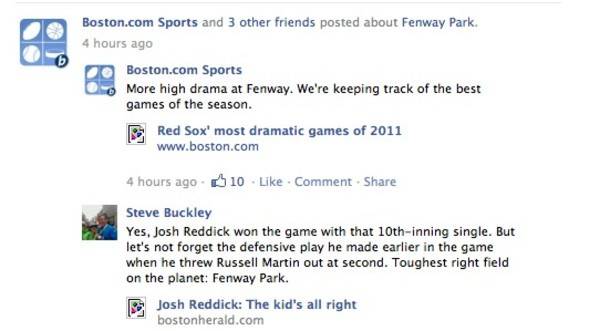You may have noticed over the weekend that Facebook has changed how it handles topics in users’ news feed. Topics are now automatically grouped together when multiple people post about the same subject and those posts are linked back to the topic’s Facebook Page. Users do not have to tag the page with an “@” symbol. Facebook analyzes the subject and message of the status update and adds it to the page accordingly. This could anger some users as Facebook is once again taking actions on users’ behalf without their consent. Yet, there are a lot of benefits to the new topic aggregating for users’ news feeds.

With automatic topic grouping by page, Facebook has essentially created curated trending topics within individual news feeds. Do you follow a lot of people and organizations that post about Apple or Android or, say, the Boston Red Sox? Facebook is attempting to bring all those posts to the surface without individual items getting lost deep in the stream. Do you like Facebook’s newest news feed feature?
Facebook has been attempting to clean up the news feed for a while. As the service grows and users have more friends and follow more groups and pages, interesting items get lost in the shuffle. That is one of the biggest problems that Google Plus has had in its first month or so of existence – feed management. The “bump” feature of Google Plus immediately started irritating users and often times the feed itself will “jump” when a user is commenting on a post further down in the stream when a new post comes to the top of the stream. It is something that Google will need to work on before the service is opened to the flood of the public.
Yet, Facebook has had the news feed for several years and, for the most part, it is a system that works. Facebook can now tinker for the purpose of refining the user experience as opposed to just making sure it is a desirable part of how people interact with the service. Hence, automatically tying similar posts together is probably a positive development, even if users whine about the change in the beginning. Anyway, Facebook users are notoriously hard to please.

The new link back to pages may also change the dynamic of how users and brands interact with them. Users will see the benefit of pages that a lot of their friends talk about but may not actually “Like.” Expect page Likes to increase as Facebook points users towards them through the news feed. Brands will also be able to take advantage of the new aggregation feature. If brands are active in how they use their pages, there is a good chance they could ensnare a couple of users’ posts within the topic grouping, which should increase Likes, time spent on page and interactivity.
















